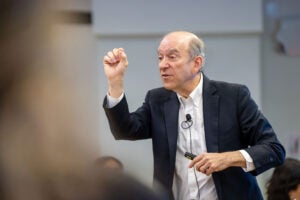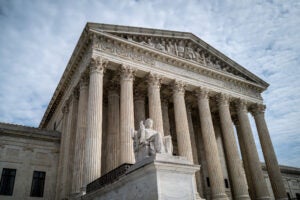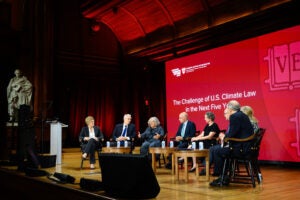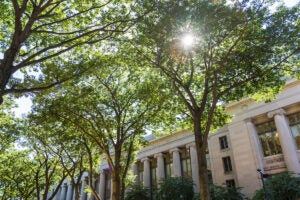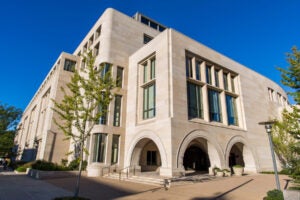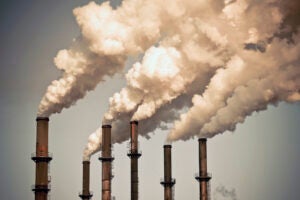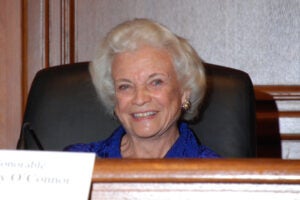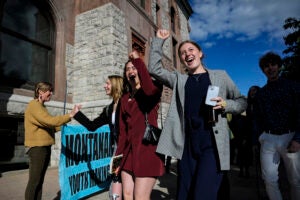People
Richard Lazarus
-
Harvard Law expert Richard Lazarus ’79 shares his take on the Supreme Court following a blockbuster term of monumental decisions.
-
Harvard Law faculty members share their thoughts on where the Supreme Court justices ultimately landed on prominent cases — and on the longer-term implications of the Court’s decisions.
-
During a discussion led by Harvard Law School Professors Richard Lazarus and Jody Freeman, a panel of legal and government experts addressed the prospects for U.S. climate law over the next five years.
-
Biden’s EPA is trying to take a huge bite out of the climate crisis. Can it survive Trump’s Supreme Court?
May 22, 2024
President Joe Biden’s Environmental Protection Agency threw down a gauntlet on climate this spring, pushing carmakers toward electric vehicles, cracking down on natural gas leaks…
-
Harvard Law’s Jody Freeman, Richard Lazarus, Andrew Mergen, and Carrie Jenks discuss the impact alumnus Dan Emmett’s $15 million gift to establish the Emmett Environmental Law Center will have for students, faculty, staff, and environmental law practitioners nationwide.
-
A gift by alumnus Dan Emmett ’64 and the Emmett Foundation will bolster the work of the law school’s Environmental Law and Policy Clinic and Environmental and Energy Law Program.
-
Environmental law expert voices warning over Supreme Court
April 19, 2024
Richard Lazarus sees conservative majority as threat to protections developed over past half century
The current conservative bent of the U.S. Supreme Court threatens… -
Verdict saying Switzerland violated rights by failing on climate action could ripple across Europe
April 9, 2024
Europe’s highest human rights court ruled Tuesday that countries must better protect their people from the consequences of climate change, siding with a group of…
-
President Biden’s climate ambitions are colliding with political and legal realities, forcing his administration to recalibrate two of its main tools to cut the emissions…
-
EPA rule that limits pollution is being challenged in the Supreme Court
February 27, 2024
LEILA FADEL, HOST: The U.S. Supreme Court today hears arguments in an environmental case that centers on the obligation to be a good neighbor. Several…
-
Supreme Court will hear challenge to EPA’s ‘good neighbor’ rule that limits pollution
February 21, 2024
The U.S. Supreme Court will hear arguments Wednesday in an important environmental case that centers on the obligation to be a “good neighbor.” Lawyers representing…
-
Previewing Supreme Court arguments about ozone pollution and the Good Neighbor Plan in shadow docket case Ohio v. EPA
February 13, 2024
Harvard Law expert Richard Lazarus believes that the outcome of Ohio v. EPA could say a lot about U.S. future efforts to regulate air pollution.
-
Clerks for hire: The Supreme Court recruiting race
January 29, 2024
Last spring, as the Supreme Court wrapped up oral arguments for what was shaping up to be a blockbuster term, the law firm Jones Day…
-
Supreme Advocate
December 20, 2023
As solicitor general, Elizabeth Prelogar ’08 faces long odds before a skeptical court
-
Remembering Justice Sandra Day O’Connor (1930-2023)
December 5, 2023
Supreme Court Associate Justice Sandra Day O’Connor, the first woman to serve on the Supreme Court, died Dec. 1. She was 93.
-
Harvard Law’s Richard Lazarus says that while the pro-environment ruling in Held v. Montana is a reason to celebrate, the impact could be limited.
-
New Top Cop at the E.P.A. Aims to Get Enforcement Back on Track
August 17, 2023
Under President Biden, the Environmental Protection Agency has closed fewer civil cases against polluters than any administration in the last two decades and has overseen…
-
Gen Z activists just won a first-of-its-kind trial against the state of Montana for violating their right to a clean environment
August 15, 2023
Young environmental activists scored what experts described as a ground-breaking legal victory Monday when a Montana judge said state agencies were violating their constitutional right…

